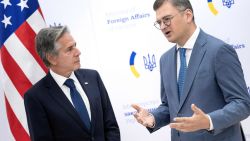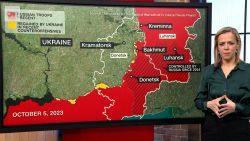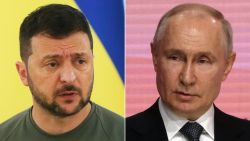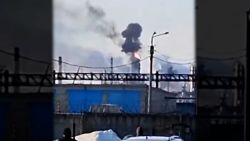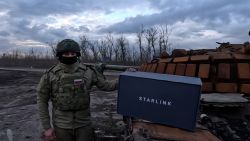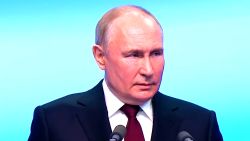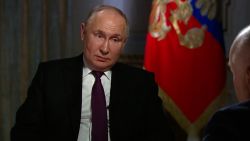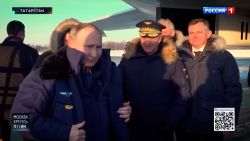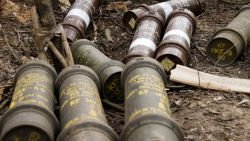It appeared to be a reversal that threatened major implications for the war. On Wednesday, the prime minister of Poland, one of Kyiv’s closest and most vocal allies, said it would “no longer transfer weapons to Ukraine.”
Yet this apparently bullish move, announced amid a bitter spat with Ukraine over grain, has now evolved into a much murkier situation.
Polish President Andrzej Duda on Thursday moved to walk back his prime minister’s comments, saying they were “interpreted in the worst possible way.”
Both Duda and Ukrainian President Volodymyr Zelensky have attempted to thaw the angry spat. But animosity remains after months of tensions over a temporary ban on Ukrainian grain imports to a number of European Union countries.
It also follows a pattern of increasingly confrontational behavior towards Kyiv from Poland’s government, just weeks before a tight general election.
Here’s what you need to know.
What has Poland announced?
“We no longer transfer weapons to Ukraine because we are now arming Poland,” Polish Prime Minister Mateusz Morawiecki said in a blunt social media statement on Wednesday that accelerated the confrontation between the allies.
Morawiecki added in a television interview that Poland would now focus on supplying “the most modern weapons” for its own purposes, state news agency PAP reported. “If you want to defend yourself you have to have something to defend with,” the prime minister said. The government meanwhile clarified he was referring to future weapons shipments, and those already agreed upon would still be completed.
Nonetheless, it seemed to indicate a major change in policy: Poland has been one of the most forthright countries in the race to get weapons and resources into Ukrainian hands. Now, Warsaw was apparently drawing a line in the sand on future donations – a potential blow for Kyiv in the event of a long, drawn-out war.
But on Thursday, Duda sought to clarify Morawiecki’s statement, saying it merely referred to new weapons being purchased for the Polish army, and that older weapons systems Warsaw deems not necessary for modernizing its own military could still be shipped across the border.
“The prime minister talked about these weapons in the context of the new weapons we are buying for our army,” Duda told Polish channel TVN24. “That was the statement. In my opinion, the prime minister said: ‘We will not transfer to Ukraine new weapons that we are currently purchasing as part of the modernization of our army.’
Duda added, “please remember that we have contracts signed with Ukraine, for example for the supply of Krabs (howitzers).” Poland still needs to fulfill that agreement, as well as other contracts, including for ammunition and mine-clearing vehicles, which “are needed for the counteroffensive,” Duda said.
“As we receive new weapons from (South) Korea and the United States, we will loosen the weapons we have in stock today. Perhaps we will transfer weapons that will be removed from the Polish army to Ukraine, just as we have done so far when we transferred post-Soviet weapons,” Duda said.
There has meanwhile never been any suggestion that Poland – the key conduit country for almost all weapons transfers into Ukraine – would stop allowing other Western weapons to pass through its borders on the way to the frontlines.
And both countries have quickly moved to dissipate anger. Kyiv’s minister of agrarian policy said he had spoken with his Polish counterpart and issued a statement saying the pair “discussed the situation and Ukraine’s proposal to resolve it, and agreed to find a solution that takes into account the interests of both countries.”
But Duda’s comments left it unclear what the true effect of Warsaw’s pronouncements might be, or whether any weapons intended for Ukraine would be impacted.
How did we get here?
Pressure has been building for months over a ban on Ukrainian grain, initially put in place earlier this year by several EU nations to protect the livelihood of local farmers worried about being undercut by the low price of Ukrainian grain.
Last week, the EU announced plans to suspend the rule. But three nations – Poland, Hungary and Slovakia – said they intended to defy the change and keep the restrictions in place. It prompted protests from Ukraine, which this week filed lawsuits against all three countries over the issue.
Ukraine, often called the “breadbasket of Europe” due to the vast quantities of grain it produces, had its Black Sea ports blockaded by Russia following its full-scale invasion in February 2022.
Fearing that the situation was “threatening global food security,” the European Commission set up what it called “solidarity lanes” in May to facilitate exports, and temporarily eliminated all duties and quotas on Ukraine’s exports, allowing a glut of cheap Ukrainian grain to flow into the continent.

Anger in Poland has been simmering since the spring, when farmers led demonstrations against the moves. But they erupted once again in recent days, after the decision of the three nations to ignore the removal of the ban.
In a swipe against the trio on Wednesday, Ukrainian President Volodymyr Zelensky told the UN General Assembly in New York that “it is alarming to see how some in Europe, some of our friends in Europe, play out solidarity in a political theater – making a thriller from the grain.”
Zelensky added that the nations involved “may seem to play their own role but in fact they are helping set the stage to a Moscow actor.” His comments sparked immediate condemnation from Poland, with the foreign ministry summoning the Ukrainian ambassador to convey its “strong protest.”
Those comments intensified anger in Warsaw, resulting just hours later in Morawiecki’s statement on weapons shipments.
When asked whether he was upset after Zelensky’s words, Duda told TVN24 “maybe upset is a too strong word.”
“I was embittered, I would rather put it that way. I say this: let’s stay calm, please do not raise the temperature, because this is a dispute that concerns a small part of our relations. Let’s not allow it to affect the whole, because there is no justification for it and only others will benefit from it,” Duda said.
A tight election looms
Poland’s initial response to the war on Ukraine earned its populist government a rare swelling of goodwill from across Europe, and made it a major player in the Western response to Russia’s aggression.
The country has taken in more than 1.5 million Ukrainian refugees and allowed 15 million to cross its borders to flee the conflict. The two countries shared a decades-old suspicion of Moscow and Warsaw had warned for years of the pitfalls of buying Russian energy, which melded their relationship in the initial phases of the war.
But tensions have frayed in recent months, exacerbated by a pivotal election.
Poland’s populist ruling party, Law and Justice (PiS), are preparing for a vote on October 15 which opinion polls suggest could result in them losing their parliamentary majority. They are particularly suffering in their stronghold rural regions in eastern Poland, where agriculture is an important economic pillar.

PiS is losing a chunk of its typical voter base to the Confederation party, a historically far-right group that has been rallying against the costs of Warsaw’s military aid to Kyiv and complained that Ukraine’s plight has become a greater priority for the government than that of Polish people.
In response, PiS has seemingly toned down its support for Kyiv in recent months and shown willingness to take on a more combative stance. In August, Warsaw summoned the Ukrainian ambassador to Poland after a Polish foreign policy adviser accused Kyiv of being ungrateful for Poland’s support in exporting its grain.
Poland’s opposition parties were quick to pounce on this week’s uncertainty over weapons shipments.
Radek Sikorski, a Member of the European Parliament and previously Poland’s defense and foreign minister, told CNN that “incompetence is at play” regarding the latest spat.
“The government failed in organizing transit corridors for Ukrainian grain to Africa and China,” Sikorski said, adding that “if Poland had a better relationship with Brussels, it could’ve all been done a year ago.”
What does this mean for the war?
While Warsaw’s position on weapons remains unclear, any reversal in Polish military and strategic support for Ukraine would have major consequences. Poland has been among the most eager nations to bolster Kyiv’s arsenal since the initial days of the full-scale war, and has shown a willingness to push other European powers and the US into joining them.
In January, when Germany agonized over whether to provide Leopard 2 battle tanks to Kyiv’s troops, Poland took a leading role in bringing together a European coalition that gave Berlin enough leeway to make the move.
For days, Polish officials talked up publicly and privately their desire to get the high-tech combat vehicles onto the front lines, and insisted they would do so whether or not fellow nations came with them.
Kyiv and its allies will have concerns that if Warsaw takes a new attitude to future arms shipments, other hesitant European countries will feel less pressure to also donate supplies. So, even if this dispute is resolved and shipments continue to Kyiv as before, the episode has brought lessons to both countries.
Poland would be hesitant to anger NATO and the United States – its two crucial security partners – by reducing the flow of weapons onto the front lines. But its domestic political context has pressed PiS into taking a firmer line on Kyiv, and a close or ambiguous electoral result next month may lengthen the tightrope the party is walking.
But Zelensky’s tough words for Poland this week have also highlighted the risks of pushing his allies’ buttons too forcefully. His UNGA speech clearly angered many in Warsaw, and the longer the grain dispute continues, the more likely spats between Kyiv and its nearest ally will become.
CNN’s Antonia Mortensen, Sharon Braithwaite, Radina Gigova, Mitchell McCluskey, Mariya Knight, Olga Voitovych and Tim Lister contributed reporting




